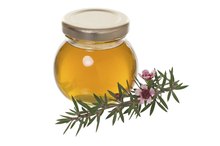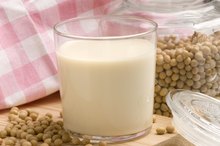Honey is a sugar-rich syrup that is purported to be a beneficial sweetener because it contains natural sugar, rather than artificial sweeteners such as high-fructose corn syrup. While honey can be beneficial in some ways, one nutritional use for which honey is unlikely to be beneficial is increasing testosterone. Several nutrients can increase testosterone levels, but honey is not rich in these nutrients, so it is unlikely to impact your testosterone level. Consult a doctor prior to addressing any medical conditions, such as low testosterone.
Fiber
One potential benefit of honey for increasing testosterone levels is that it contains no dietary fiber. Dietary fiber is a crucial nutrient that aids in healthy digestion, promotes feelings of fullness and can help stabilize blood sugar levels. However, research published in the December 1996 edition of "The American Journal of Clinical Nutrition" indicates that too much fiber can inhibit testosterone production 2. Thus, replacing fiber-rich foods with honey may aid in increasing your testosterone levels.
- One potential benefit of honey for increasing testosterone levels is that it contains no dietary fiber.
Fat
Whey & Testosterone
Learn More
Honey contains no dietary fat, which can be helpful if you're trying to cut fat and calories, but it's detrimental for testosterone production. In addition to supplying energy and helping your body absorb vitamins, dietary fat is involved in hormone production. **According to research published in the November 2004 issue of "International Journal of Sports Medicine," increased fat intake can promote increased testosterone levels 3.
Sugar
Honey is high in sugar, with more than 17 g in each 1 tbsp. serving. While sugar makes honey taste good and can provide energy, it can be detrimental for hormonal levels. Research performed in 2009 at Massachusetts General Hospital found that consuming sugar caused a reduction in testosterone levels, so honey is not a good food choice for enhancing testosterone release.
- Honey is high in sugar, with more than 17 g in each 1 tbsp.
- Research performed in 2009 at Massachusetts General Hospital found that consuming sugar caused a reduction in testosterone levels, so honey is not a good food choice for enhancing testosterone release.
Magnesium
The Disadvantages of Sweet Potatoes and Yams
Learn More
In addition to dietary fat, other nutrients can promote increased release of testosterone. Among them is magnesium, according to a study from the February 2009 edition of "Journal of Pharmaceutical and Biomedical Analysis." Unfortunately, honey is devoid of magnesium, so it can't supply this testosterone-boosting benefit 5.
Related Articles
References
- "The American Journal of Clinical Nutrition": Effects of Dietary Fat and Fiber on Plasma and Urine Androgens and Estrogens in Men: A Controlled Feeding Study; J.F. Dorgan et al.; December 1996
- "International Journal of Sports Medicine": Relationship Between Diet and Serum Anabolic Hormone Responses to Heavy-Resistance Exercise in Men; J. Sallinen et al.; November 2004
- PhysOrg: Testosterone Decreases After Ingestion of Sugar; the Endocrine Society; June 2009
- "Journal of Pharmaceutical and Biomedical Analysis": Magnesium Effect on Testosterone-SHBG Association Studied by a Novel Molecular Chromatography Approach; L. Excoffon et al; February 2009
- Stanworth RD, Jones TH. Testosterone for the aging male; current evidence and recommended practice. Clin Interv Aging. 2008;3(1):25–44. doi:10.2147/cia.s190
- McBride JA, Carson CC 3rd, Coward RM. Testosterone deficiency in the aging male. Ther Adv Urol. 2016;8(1):47–60. doi:10.1177/1756287215612961
- Kumar P, Kumar N, Thakur DS, Patidar A. Male hypogonadism: Symptoms and treatment. J Adv Pharm Technol Res. 2010;1(3):297–301. doi:10.4103/0110-5558.72420
- Johnson JM, Nachtigall LB, Stern TA. The effect of testosterone levels on mood in men: a review. Psychosomatics. 2013;54(6):509-14.
- Rajfer J. Relationship between testosterone and erectile dysfunction. Rev Urol. 2000;2(2):122–128.
- Barrett-Connor E, Dam TT, Stone K, et al. The association of testosterone levels with overall sleep quality, sleep architecture, and sleep-disordered breathing. J Clin Endocrinol Metab. 2008;93(7):2602–2609. doi:10.1210/jc.2007-2622
- Beauchet O. Testosterone and cognitive function: current clinical evidence of a relationship. Eur J Endocrinol. 2006;155(6):773-81.
- Golds G, Houdek D, Arnason T. Male Hypogonadism and Osteoporosis: The Effects, Clinical Consequences, and Treatment of Testosterone Deficiency in Bone Health. Int J Endocrinol. 2017;2017:4602129. doi:10.1155/2017/4602129
- Grossmann M, Thomas MC, Panagiotopoulos S, et al. Low testosterone levels are common and associated with insulin resistance in men with diabetes. J Clin Endocrinol Metab. 2008;93(5):1834-40.
- Cai Z, Xi H, Pan Y, et al. Effect of testosterone deficiency on cholesterol metabolism in pigs fed a high-fat and high-cholesterol diet. Lipids Health Dis. 2015;14:18. Published 2015 Mar 7. doi:10.1186/s12944-015-0014-5
- Ferrucci L, Maggio M, Bandinelli S, et al. Low testosterone levels and the risk of anemia in older men and women. Arch Intern Med. 2006;166(13):1380–1388. doi:10.1001/archinte.166.13.1380
- Nassar GN, Leslie SW. Physiology, Testosterone. [Updated 2018 Oct 27]. In: StatPearls [Internet]. Treasure Island (FL): StatPearls Publishing; 2019 Jan-.
- Rivas AM, Mulkey Z, Lado-Abeal J, Yarbrough S. Diagnosing and managing low serum testosterone. Proc (Bayl Univ Med Cent). 2014;27(4):321–324. doi:10.1080/08998280.2014.11929145
- Kanakis GA, Nieschlag E. Klinefelter syndrome: more than hypogonadism. Metab Clin Exp. 2018;86:135-144.
- Sizar O, Schwartz J. Hypogonadism. [Updated 2019 Jun 4]. In: StatPearls [Internet]. Treasure Island (FL): StatPearls Publishing; 2019 Jan-.
- Nahata L, Yu RN, Bhasin S, Cohen LE. Management of testosterone therapy in adolescents and young men with hypogonadism: are we following adult clinical practice guidelines?. J Pediatr Endocrinol Metab. 2015;28(5-6):635-40.
- McBride JA, Carson CC, Coward RM. Diagnosis and management of testosterone deficiency. Asian J Androl. 2015;17(2):177–186. doi:10.4103/1008-682X.143317
- Crawford ED, Poage W, Nyhuis A, et al. Measurement of testosterone: how important is a morning blood draw?. Curr Med Res Opin. 2015;31(10):1911-4.
- Wersinger SR, Haisenleder DJ, Lubahn DB, Rissman EF. Steroid feedback on gonadotropin release and pituitary gonadotropin subunit mRNA in mice lacking a functional estrogen receptor alpha. Endocrine. 1999;11(2):137-43.
- Rhoden EL, Estrada C, Levine L, Morgentaler A. The value of pituitary magnetic resonance imaging in men with hypogonadism. J Urol. 2003;170(3):795-8.
- Snyder PJ, Kopperdahl DL, Stephens-Shields AJ, et al. Effect of Testosterone Treatment on Volumetric Bone Density and Strength in Older Men With Low Testosterone: A Controlled Clinical Trial [published correction appears in JAMA Intern Med. 2017 Apr 1;177(4):600] [published correction appears in JAMA Intern Med. 2019 Mar 1;179(3):457]. JAMA Intern Med. 2017;177(4):471–479. doi:10.1001/jamainternmed.2016.9539
- Huo S, Scialli AR, McGarvey S, et al. Treatment of Men for "Low Testosterone": A Systematic Review. PLoS One. 2016;11(9):e0162480. Published 2016 Sep 21. doi:10.1371/journal.pone.0162480
- Armamento-Villareal R, Aguirre LE, Qualls C, Villareal DT. Effect of Lifestyle Intervention on the Hormonal Profile of Frail, Obese Older Men. J Nutr Health Aging. 2016;20(3):334–340. doi:10.1007/s12603-016-0698-x
- American Urological Association. Evaluation and management of testosterone deficiency.
- Grech A, Breck J, Heidelbaugh J. Adverse effects of testosterone replacement therapy: an update on the evidence and controversy. Ther Adv Drug Saf. 2014;5(5):190–200. doi:10.1177/2042098614548680
- American Urological Association, Evaluation and Management of Testosterone Deficiency.
- Fillo J, Breza J Jr, Ondrusova M, Luha J, Ondrus D, Dubravicky J, et al. Results of long term testosterone replacement therapy in men with abdominal obesity, erectile dysfunction and testosterone deficiency. Bratisl Lek Listy. 2018;119(9):577-580. doi:10.4149/BLL_2018_061
- Tremellen K, McPhee N, Pearce K, Benson S, Schedlowski M, Engler H. Endotoxin-initiated inflammation reduces testosterone production in men of reproductive age. Am J Physiol Endocrinol Metab. 2018 Mar 1;314(3):E206-E213. doi:10.1152/ajpendo.00279.2017. Epub 2017 Nov 28.
Writer Bio
Brian Willett began writing in 2005. He has been published in the "Buffalo News," the "Daytona Times" and "Natural Muscle Magazine." Willett also writes for Bloginity.com and Bodybuilding.com. He is an American Council on Exercise-certified personal trainer and earned a Bachelor of Arts in journalism from the University of North Carolina.









